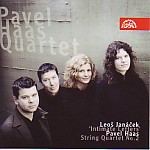The Pavel Haas Quartet is yet another exceptional young ensemble from the Czech Republic, and this debut recording is a major statement. They are coached by Milan Škampa, violist of the Smetana Quartet, and their performance of Janácek’s “Intimate Letters” reveals their mentor’s influence in details such as the quick tempo for the finale. Otherwise this is very much an individual performance of a work that seems able to absorb just about anything interpretively that you might care to throw at it.
In this case, we hear an unusually wide range of tempo contrasts, but also extreme care in making transitions from one section to the next. The frantic outburst in the middle of the second movement offers a particularly telling example, and the collective virtuosity required to phrase with such unanimity is really astonishing. In short, this is yet another first-rate performance of this glorious work, one of the pinnacles of the quartet literature. It also makes the ideal coupling with the Second String Quartet of Pavel Haas.
Haas is best known today for his brief Study for Strings, written in the Terezín concentration camp and first performed under Karel Ancerl and his orchestra of Jewish musicians. A pupil of Janácek, and the one composer often said to most resemble him in style, Haas died at Auschwitz in 1944. The Second Quartet’s subtitle, “From the Monkey Mountains”, refers to a popular Czech resort area and highlights the music’s sources of inspiration: nature, folk music, and many of the same sights and sounds that Janácek evokes in his music (chamber or otherwise).
One unusual feature of this quartet is the inclusion of percussion in the finale (“Wild Night”). It works splendidly, though the piece also can be played without it. The only serious competition for this music comes from the Kocian Quartet on Praga, a disc containing all three Haas quartets, and good though that performance is, this one is even better, if only slightly so. Part of the reason stems from the perfectly balanced ensemble and beautifully smooth string sonority, a specialty of the best Czech quartets from the Smetana to the Panocha, Prazák, and Talich Quartets. This quality allows the players to really dig into the music without ever making an ugly sound (except when the music asks for one).
For example, that nasty explosion just before the end of “Intimate Letters”, or the grinding sonorities of “Coach, Coachman, and Horse” in the Haas quartet, really stand out, much more so than in performances where a generalized timbral harshness is mistaken for intensity of expression. Kudos also to percussionist Colin Currie, whose trap-set playing meshes ideally with that of the quartet, neither too prominent nor too reticent, giving the Haas finale all of the color and personality that it needs. Great sonics too. A stupendous release! [10/16/2006]
































